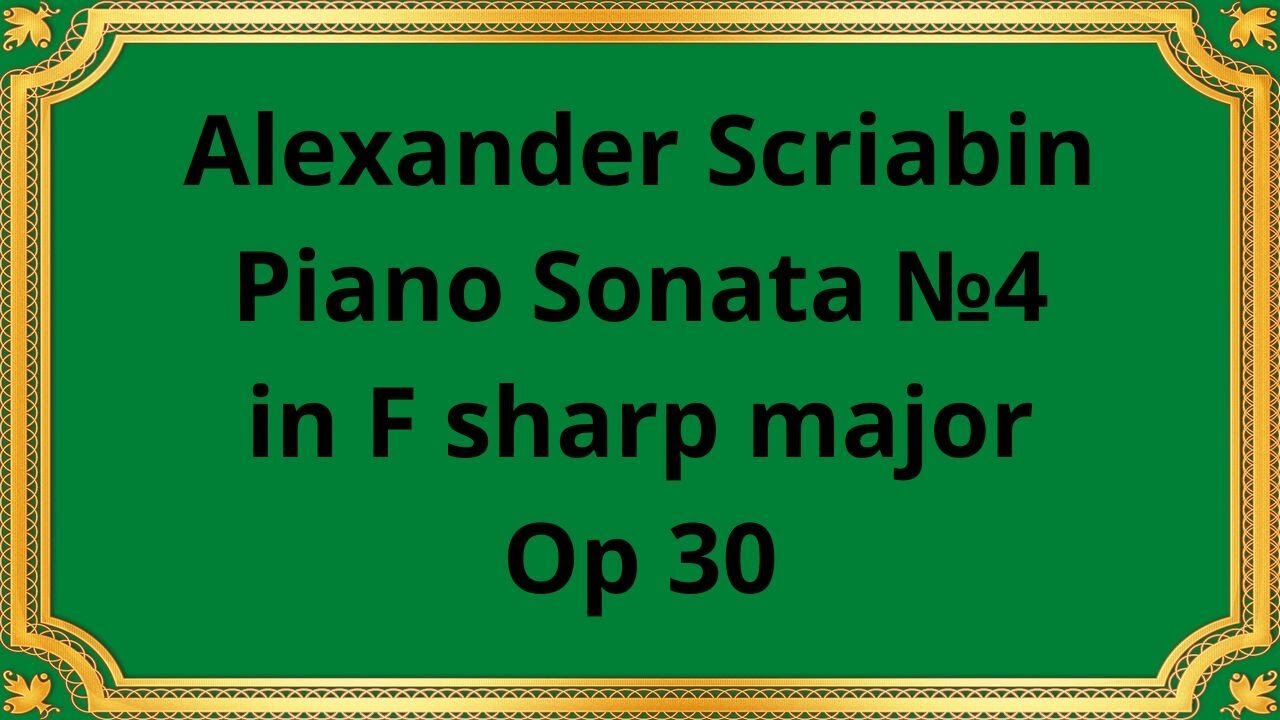Premium Only Content

Alexander Scriabin Piano Sonata №4 in F sharp major Op 30
#ClassicalMusic #Scriabin #PianoSonata #FSharpMajor #Op309 #MusicalComposition
Publication date 1937
Katherine Ruth Heyman (piano)
Alexander Scriabin, a renowned Russian composer and pianist, left an indelible mark on the world of classical music. Among his notable compositions, the Piano Sonata No. 4 in F sharp major Op. 30 stands as a testament to his innovation and emotional depth.
The Piano Sonata No. 4 was composed between 1903 and 1905, a time when Scriabin was transitioning from a more traditional style to a more experimental and expressive approach. This period marked a departure from the romantic era, with composers embracing new harmonic languages and pushing the boundaries of tonality.
The sonata follows a traditional three-movement structure: Allegro, Prestissimo volando, and Andante. The first movement introduces the main themes and explores contrasting tonalities, showcasing Scriabin's adeptness at chromatic harmonies. The second movement, known for its lightning-fast tempo, captivates listeners with its virtuosic passages and intense energy. The final movement, Andante, provides a serene and lyrical contrast, bringing a sense of resolution and tranquility.
Scriabin's Piano Sonata No. 4 is renowned for its unique harmonic language. The piece incorporates atonal elements, dissonance, and unconventional chord progressions, reflecting Scriabin's exploration of new tonal possibilities. The melodic lines are often intricate, combining sweeping romantic melodies with highly chromatic passages. This fusion of harmonies and melodies creates an ethereal and introspective atmosphere.
One distinctive aspect of Scriabin's music is his belief in the power of synesthesia, a condition where one sense triggers the perception of another. In the case of this sonata, Scriabin associated each movement with specific colors and emotions. The first movement is associated with white light and joy, the second with a dark blue hue and intense passion, and the final movement with golden light and a sense of tranquility. This unique approach adds an extra layer of depth and complexity to the composition.
Scriabin's Piano Sonata No. 4 is an embodiment of the composer's own emotional journey. It conveys a wide range of emotions, from euphoria and ecstasy to melancholy and introspection. The contrasting moods and expressive passages allow listeners to experience a profound emotional connection and evoke personal interpretations.
Alexander Scriabin's Piano Sonata No. 4 in F sharp major Op. 30 stands as a testament to his innovative spirit and emotional depth. Through its harmonic explorations, melodic intricacies, and synesthetic associations, the sonata offers a captivating musical experience. This piece showcases Scriabin's ability to push the boundaries of traditional composition while maintaining a deep emotional resonance. It continues to captivate audiences and holds a significant place in the realm of classical music.
You have the opportunity to support the channel:
https://destream.net/live/RadSiarAl/donate
https://www.buymeacoffee.com/6355radsiaral
-
 8:08
8:08
Guns & Gadgets 2nd Amendment News
1 day ago16 States Join Forces To Sue Firearm Manufacturers Out of Business - 1st Target = GLOCK
34.9K40 -
 10:17
10:17
Dermatologist Dr. Dustin Portela
1 day ago $5.04 earnedOlay Cleansing Melts: Dermatologist's Honest Review
36.4K -
 1:02:20
1:02:20
Trumpet Daily
1 day ago $18.39 earnedObama’s Fake World Comes Crashing Down - Trumpet Daily | Dec. 20, 2024
21.8K21 -
 6:29
6:29
BIG NEM
19 hours agoCultivating God Mode: Ancient Taoist NoFap Practices
17.4K6 -
 30:53
30:53
Uncommon Sense In Current Times
1 day ago $2.93 earned"Pardon or Peril? How Biden’s Clemency Actions Could Backfire"
26.9K2 -
 40:01
40:01
CarlCrusher
17 hours agoSkinwalker Encounters in the Haunted Canyons of Magic Mesa - ep 4
31.1K2 -
 59:44
59:44
PMG
1 day ago $3.32 earned"BETRAYAL - Johnson's New Spending Bill EXPANDS COVID Plandemic Powers"
43.9K14 -
 6:48:50
6:48:50
Akademiks
16 hours agoKendrick Lamar and SZA disses Drake and BIG AK? HOLD UP! Diddy, Durk, JayZ update. Travis Hunter RUN
166K28 -
 11:45:14
11:45:14
Right Side Broadcasting Network
9 days agoLIVE REPLAY: TPUSA's America Fest Conference: Day Three - 12/21/24
350K28 -
 12:19
12:19
Tundra Tactical
16 hours ago $12.92 earnedDaniel Penny Beats Charges in NYC Subway Killing
69K12